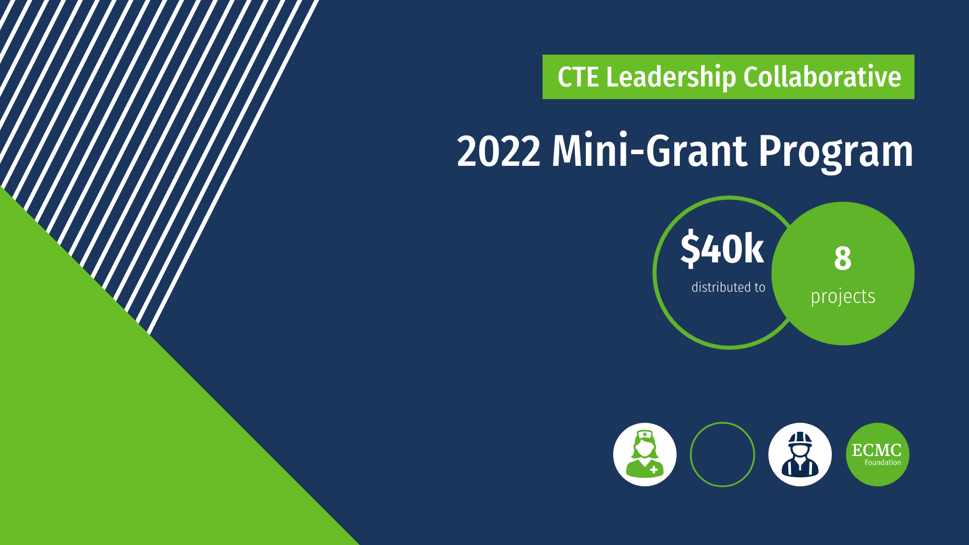CTE Leadership Collaborative 2022 Mini-Grant Program Recipients Announced
The program, designed to inspire partnership and ideas across fellowship programs, will see an increase in participation and funding in its second year
June 03, 2022

In its second year, the CTE Leadership Collaborative’s Mini-Grant Program continues to spark new ideas for advancing the field of career and technical education (CTE).
The Mini-Grant Program is an invitation-only, competitive funding opportunity for ECMC Foundation Fellows (Fellows) who are interested in launching innovative projects with Fellows from other programs. ECMC Foundation’s CTE Leadership Collaborative aims to advance the CTE field by bringing a diverse group of leaders across a range of geographies, approaches and disciplines—including research, data analytics, business and industry, journalism, higher education, and government—to make connections and share ideas.
With more applications this year than in 2021, ECMC Foundation awarded eight projects $5,000 each for a total of $40,000. From a podcast exploring Black Americans’ experience with CTE to new research that investigates the cultural experience of a group of rural community college students in Wyoming, the range of proposed projects highlights the diversity of CTE.
Congratulations to the following eight exciting projects. To learn more about the Fellows, please visit our directory of ECMC Foundation Fellows.
Aligning Business Needs with Educational Outputs: The Community College Use of Labor Market Information Centers to Develop an Optimal Talent Development Pipeline
David Tobenkin (IC&S) and Adam Atwell (NCSU) will study emerging labor market data centers (LMIs) and their potential use within community college campuses with the goal of helping community colleges align their course offerings more closely to regional labor market needs through the use of a new generation of data rich LMIs.
Creating a Colorado ACTE Postsecondary, Adult and Career Education Division
Julie Simms (ACTE), Carlos Lopez (Advance CTE) and Linda Van Doren (NCSU) will use the funding for conference and travel to study best practices for the creation of a Colorado Postsecondary Adult and Career Education (PACE) Division. The goal is to expand professional development opportunities focused specifically on postsecondary CTE professionals.
Exploring Community College and Workforce Education Leadership
Sara Shaw (NCSU) and Paul-Arthur Pierre-Louis (NCSU) will produce podcasts that address the experiences of community and technical college leaders during and after the pandemic, focusing on such topics as diversity and ethnicity, career decision-making, community partnerships, and CTE postsecondary recruitment and retention. The goal is to build a community of practice for aspiring CTE leaders that embodies a wide array of backgrounds and identities (such as gender, ethnicity, disability, languages, and professional experiences).
History Doesn't Decide for Us (A Podcast)
Nzingha Williams (NCSU) will produce a podcast that highlights key historical and contemporary CTE issues as they impact Black Americans. The goal of these podcasts is to assess the disconnect between the Black American community and the pursuit of CTE careers and describe how contemporary CTE initiatives can address economic mobility within the Black community.
Integrating Entrepreneurship with Postsecondary CTE Faculty Learning Communities
Anthony Perry (NCSU), Rosemary McBride (NCSU) and Bradley Kinsinger (ACTE) will assemble a learning community of 12 postsecondary CTE faculty who teach in the fields of skilled trades, allied health, and applied sciences to develop curricular advancements that promote creativity, innovation, and ingenuity in CTE programs. The goal is to create “entrepreneurial self-efficacy”—alongside traditional technical skills—that will add labor market value for CTE students.
Postsecondary CTE Teacher Recruitment, Training, and Retention Toolkit: A Nationwide Search
Lisa Martino (NCSU), Sara Shaw (NCSU) and Jodi Adams (NCSU) will use the funds for conference and travel to attend one of five CTE-focused conferences. The goal is to develop a digital toolkit of practical and proven strategies for recruitment, training, and retention of postsecondary CTE instructors, and to promote equity in postsecondary CTE education based on interviews conducted at the CTE-focused convenings.
Post-Secondary Site Visit Spotlights
Brian Rick (ACTE) and Eric Sewell (ACTE) will develop virtual visits of exemplary CTE programs across the country. The goal is to expand awareness of well-regarded CTE programs nationally through the expansion of digital tools that will allow interested CTE professionals and advocates to participate remotely.
The Cultural Experiences of Rural, Poor and Working-Class Students at Wyoming Community Colleges and Technical Institutions
Ty McNamee (NCSU), Misti Jeffers (NCSU) and Mason Lefler (NCSU) will conduct research about the cultural experiences of rural, poor and working-class students attending Wyoming community colleges and technical institutions. The goal is to significantly expand awareness of how the cultural experiences of these students play a role in education attainment, and to create a research- and data-rich set of policy and practice guides for other CTE professionals looking to support students with similar backgrounds in other regions.
All grant recipients will submit reports on their projects at the conclusion of the grant period. We look forward to sharing their learnings.
The CTE Leadership Collaborative Mini-Grant Program application for ECMC Foundation Fellows will reopen in Spring 2023.
